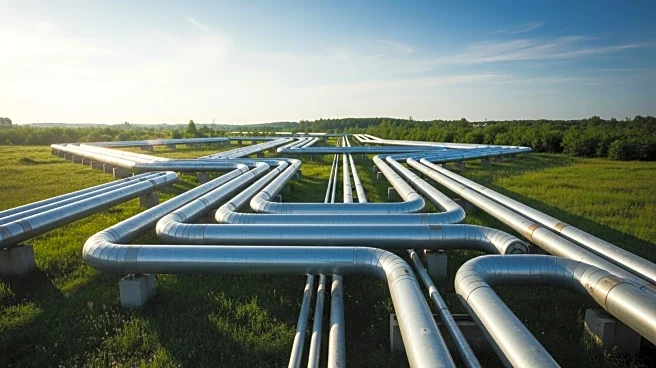What's Happening?
Summit Carbon Solutions is facing significant hurdles in its plan to construct a carbon dioxide pipeline intended to capture emissions from ethanol plants in Iowa and other Midwestern states. The company is requesting Iowa regulators to amend its pipeline permit to explore alternative sequestration sites in Nebraska, Wyoming, Colorado, and Kansas. This move comes after South Dakota regulators twice rejected Summit's application due to a ban on using eminent domain, which prevents the company from accessing necessary land. The original plan was to sequester carbon in North Dakota, but the inability to route through South Dakota has prompted Summit to consider other options. The situation is currently under judicial review, with a judge deciding whether to send the case back to regulators for further consideration.
Why It's Important?
The development is crucial as it highlights the ongoing challenges in balancing environmental initiatives with property rights and regulatory frameworks. Summit's pipeline project aims to significantly reduce the carbon footprint of ethanol production, potentially qualifying it for federal tax credits. However, the opposition from landowners and environmental groups underscores the contentious nature of using eminent domain for private projects. The outcome of this case could set precedents for future infrastructure projects, impacting how companies navigate regulatory landscapes and engage with local communities. If successful, the project could bolster the ethanol industry by expanding markets and supporting rural economies.
What's Next?
The Polk District Court is expected to issue a decision soon on whether to proceed with a judicial review or return the case to the Iowa Utilities Commission. This decision will determine the next steps for Summit's permit amendment request and could influence the company's strategy in selecting viable sequestration sites. Stakeholders, including landowners and environmental groups, are closely monitoring the situation, as the court's ruling could affect the timeline and feasibility of the pipeline project. Additionally, the broader implications for eminent domain use in Iowa may prompt legislative action, potentially reshaping the regulatory environment for similar projects.
Beyond the Headlines
The case raises deeper questions about the ethical use of eminent domain for private gain versus public benefit. It also highlights the complexities of transitioning to low-carbon technologies while respecting landowner rights and environmental concerns. The long-term impact on rural communities and the ethanol industry could be significant, depending on the project's success and acceptance. Furthermore, the legal and regulatory challenges faced by Summit may influence future policy discussions on infrastructure development and environmental sustainability.










